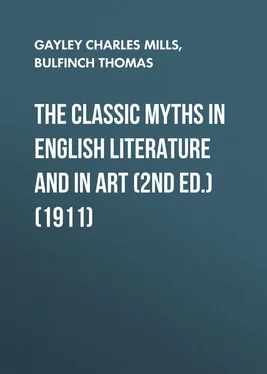Thomas Bulfinch - The Classic Myths in English Literature and in Art (2nd ed.) (1911)
Здесь есть возможность читать онлайн «Thomas Bulfinch - The Classic Myths in English Literature and in Art (2nd ed.) (1911)» — ознакомительный отрывок электронной книги совершенно бесплатно, а после прочтения отрывка купить полную версию. В некоторых случаях можно слушать аудио, скачать через торрент в формате fb2 и присутствует краткое содержание. Жанр: foreign_antique, foreign_prose, на английском языке. Описание произведения, (предисловие) а так же отзывы посетителей доступны на портале библиотеки ЛибКат.
- Название:The Classic Myths in English Literature and in Art (2nd ed.) (1911)
- Автор:
- Жанр:
- Год:неизвестен
- ISBN:нет данных
- Рейтинг книги:4 / 5. Голосов: 1
-
Избранное:Добавить в избранное
- Отзывы:
-
Ваша оценка:
- 80
- 1
- 2
- 3
- 4
- 5
The Classic Myths in English Literature and in Art (2nd ed.) (1911): краткое содержание, описание и аннотация
Предлагаем к чтению аннотацию, описание, краткое содержание или предисловие (зависит от того, что написал сам автор книги «The Classic Myths in English Literature and in Art (2nd ed.) (1911)»). Если вы не нашли необходимую информацию о книге — напишите в комментариях, мы постараемся отыскать её.
The Classic Myths in English Literature and in Art (2nd ed.) (1911) — читать онлайн ознакомительный отрывок
Ниже представлен текст книги, разбитый по страницам. Система сохранения места последней прочитанной страницы, позволяет с удобством читать онлайн бесплатно книгу «The Classic Myths in English Literature and in Art (2nd ed.) (1911)», без необходимости каждый раз заново искать на чём Вы остановились. Поставьте закладку, и сможете в любой момент перейти на страницу, на которой закончили чтение.
Интервал:
Закладка:
37. Vesta (Hestia), goddess of the hearth, public and private, was the first-born child of Cronus and Rhea and, accordingly, the elder sister of Jupiter, Juno, Neptune, Pluto, and Ceres. Vesta was an old maid by choice. Averse to Venus and all her ways, she scorned the flattering advances of both Neptune and Apollo, and resolved to remain single. Whereupon Jupiter gave her to sit in the middle of his palace, to receive in Olympus the choicest morsels of the feast, and, in the temples of the gods on earth, reverence as the oldest and worthiest of Olympian divinities. As goddess of the burning hearth, Vesta is the divinity of the home: of settled, in opposition to nomadic, habits of life. She was worshiped first of the gods at every feast. Before her shrine in city and state the holy flame was religiously cherished. From her altars those of the other gods obtained their fires. No new colony, no new home, was duly consecrated till on its central hearth there glowed coals from her ancestral hearth. In her temple at Rome a sacred fire, tended by six virgin priestesses called Vestals, was kept religiously aflame. As the safety of the city was held to be connected with its conservation, any negligence, by which it might go out, was severely punished. Whenever the fire did die, it was rekindled from the rays of the sun.
38.Of the Lesser Divinities of Heaventhe most worthy of mention are:
1. Cupid (Eros) , small but mighty god of love, the son of Venus and her constant companion. He was often represented with eyes covered because of the blindness of his actions. With his bow and arrows, he shot the darts of desire into the bosoms of gods and men. Another deity named Anteros , reputed the brother of Eros, was sometimes represented as the avenger of slighted love, and sometimes as the symbol of reciprocal affection. Venus was also attended at times by another brother of Eros, Himeros , or Longing, and by Hymen , a beautiful youth of divine descent, the personification of the wedding feast and leader of the nuptial chorus. Of Eros the poet Gosse writes:
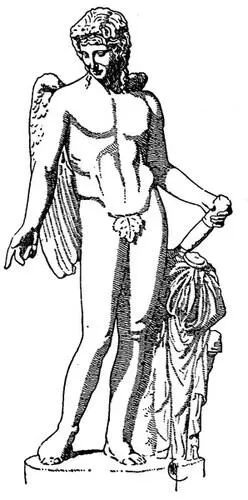
Fig. 21. Eros
Within a forest, as I strayed
Far down a somber autumn glade,
I found the god of love;
His bow and arrows cast aside,
His lovely arms extended wide,
A depth of leaves above,
Beneath o'erarching boughs he made
A place for sleep in russet shade.
His lips, more red than any rose,
Were like a flower that overflows
With honey pure and sweet;
And clustering round that holy mouth,
The golden bees in eager drouth
Plied busy wings and feet;
They knew, what every lover knows,
There's no such honey-bloom that blows. 38 38 Eros, by Edmund Gosse. For verses on the blindness of Cupid, see Lyly's Cupid and Campaspe in Commentary.
2. Hebe , daughter of Jupiter and Juno, goddess of youth and cupbearer to the gods. According to one story, she resigned that office on becoming the wife of Hercules. According to another, Hebe was dismissed from her position in consequence of a fall which she met with one day when in attendance on the gods. Her successor was Ganymede , a Trojan boy whom Jupiter, in the disguise of an eagle, seized and carried off from the midst of his playfellows on Mount Ida, bore up to Heaven, and installed in the vacant place.
3. The Graces , daughters of Jove by Eurynome, daughter of Oceanus. They were goddesses presiding over the banquet, the dance, all social pleasures, and polite accomplishments. They were three in number, – Euphrosyne, Aglaia, and Thalia. Spenser describes the office of the Graces thus:
These three on men all gracious gifts bestow
Which deck the body or adorn the mind,
To make them lovely or well-favored show;
As comely carriage, entertainment kind,
Sweet semblance, friendly offices that bind,
And all the complements of courtesy;
They teach us how to each degree and kind
We should ourselves demean, to low, to high,
To friends, to foes; which skill men call civility.
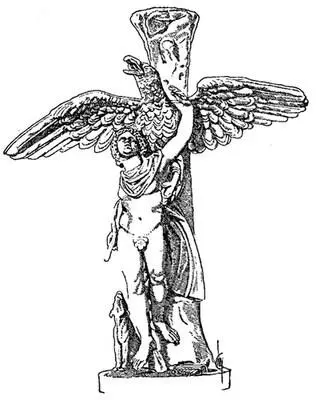
Fig. 22. Rape of Ganymede
4. The Muses , daughters of Jupiter and Mnemosyne (Memory). They presided over song and prompted the memory. They are ordinarily cited as nine in number; and to each of them was assigned patronage in some department of literature, art, or science. Calliope was the muse of epic poetry, Clio of history, Euterpe of lyric poetry, Melpomene of tragedy, Terpsichore of choral dance and song, Erato of love poetry, Polyhymnia of sacred poetry, Urania of astronomy, Thalia of comedy.
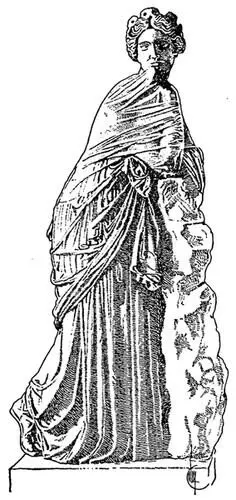
Fig. 23. Polyhymnia
5. Themis , one of the Titans, a daughter of Uranus. She sat, as goddess of justice, beside Jupiter on his throne. She was beloved of the father of gods and men, and bore him the Hours, goddesses who regulated the seasons, and the Fates.
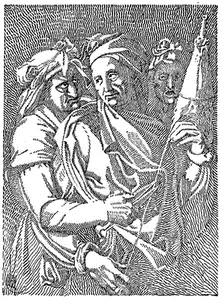
Fig. 24. The Three Fates
From the painting by Michelangelo(?)
6. The Fates , three in number, – Clotho, Lachesis, and Atropos. Their office was to spin the thread of human destiny, and they were provided with shears with which they cut it off when they pleased. 39 39 For description of their spinning, see translation of Catullus, LXIV, in § 191.
According to Hesiod, they were daughters of Night.
7. Nemesis , daughter of Night. She represented the righteous anger and vengeance of the gods, particularly toward the proud, the insolent, and breakers of the law.
8. Æsculapius , son of Apollo. By his skill in medicine he restored the dead to life. Being killed by the lightning of Jove, he was translated to the ranks of Heaven. His function was the art of healing.
9. The Winds , – Boreas, or Aquilo, the north wind; Zephyrus, or Favonius, the west; Notus, or Auster, the south; and Eurus, the east. The first two, chiefly, have been celebrated by the poets, the former as the type of rudeness, the latter of gentleness. It is said that Boreas loved the nymph Orithyia and tried to play the lover's part, but met with poor success; for it was hard for him to breathe gently, and sighing was out of the question.
Weary at last of fruitless endeavors, he acted out his true character, seized the maiden and bore her off. Their children were Zetes and Calaïs, winged warriors, who accompanied the Argonautic expedition and did good service in an encounter with those monstrous birds, the Harpies. Zephyrus was the lover of Flora (Chloris).
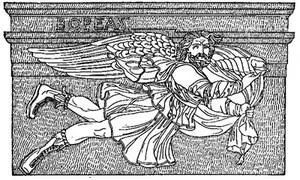
Fig. 25. Boreas
Here, too, may be mentioned Æolus, the king of the winds, although he is not a lesser divinity of Heaven. His palace was on the precipitous isle of Æolia, where, with his six sons and six daughters, he kept eternal carouse. The winds, which he confined in a cavern, he let loose as he saw fit or as he was bidden by superior deities. He is sometimes called Hippotades. 40 40 See Commentary.
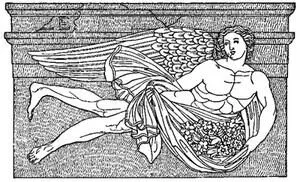
Fig. 26. Zephyros
Читать дальшеИнтервал:
Закладка:
Похожие книги на «The Classic Myths in English Literature and in Art (2nd ed.) (1911)»
Представляем Вашему вниманию похожие книги на «The Classic Myths in English Literature and in Art (2nd ed.) (1911)» списком для выбора. Мы отобрали схожую по названию и смыслу литературу в надежде предоставить читателям больше вариантов отыскать новые, интересные, ещё непрочитанные произведения.
Обсуждение, отзывы о книге «The Classic Myths in English Literature and in Art (2nd ed.) (1911)» и просто собственные мнения читателей. Оставьте ваши комментарии, напишите, что Вы думаете о произведении, его смысле или главных героях. Укажите что конкретно понравилось, а что нет, и почему Вы так считаете.
